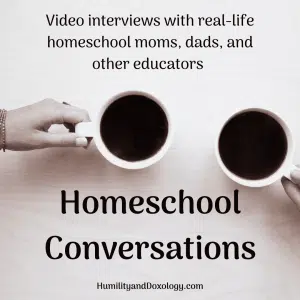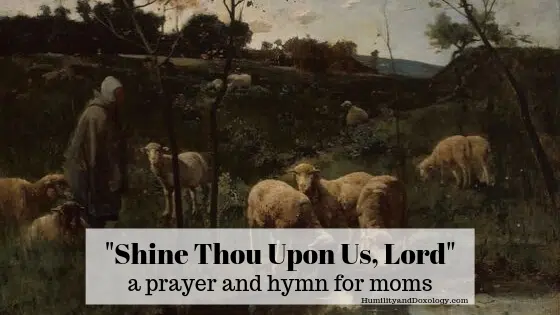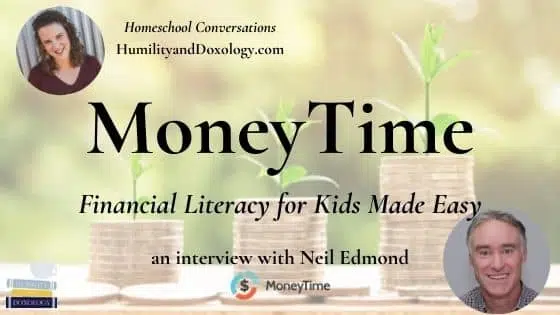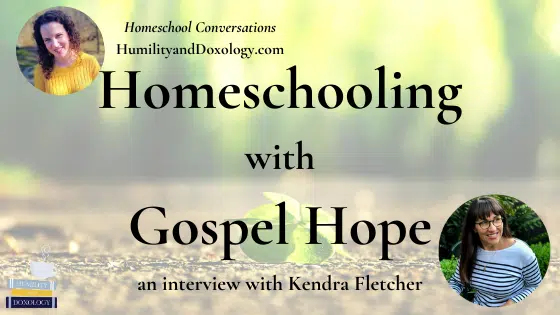If you’re a book-loving homeschool mom, you probably already know and love Sarah Mackenzie. Her books and podcast are beloved by many, and her encouragement has been an integral part of my own homeschool journey for many years. So it made me absolutely giddy to get to chat with her recently for this special bonus episode of the Homeschool Conversations podcast! We talked about how we know if we’re doing enough as homeschool moms, how to fight the worries that we might be failing our kids, and how to prioritize what’s truly important in the homeschool day. Plus, we talked about Sarah’s brand new picture book, A Little More Beautiful! Listen, watch, read and enjoy!
Be sure to check out all the other interviews in our Homeschool Conversations series!
Watch the video. Listen to the podcast. Read the show notes. Share with your friends!
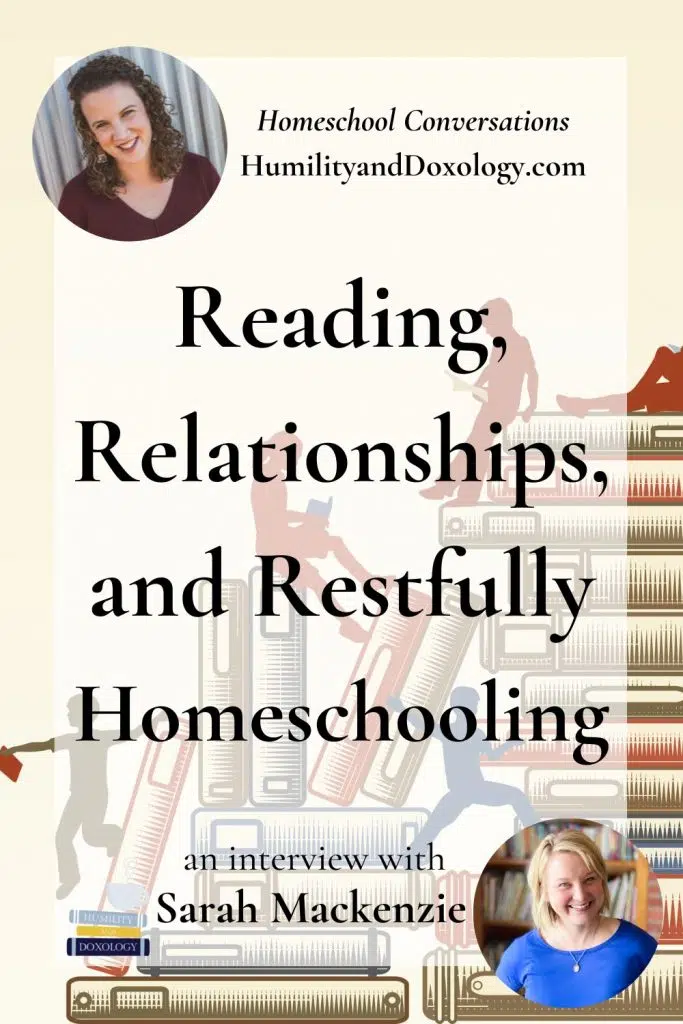
{This post contains paid links. Please see disclaimer.}
Who is Sarah Mackenzie
Sarah Mackenzie is best known as the author of Teaching from Rest: A Homeschooler’s Guide to Unshakable Peace and The Read-Aloud Family: Make Meaningful and Lasting Connections With Your Kids. She’s the host of the Read Aloud Revival Podcast, which has been downloaded over 10 million times in over 160 countries. She’s also the publisher of a brand new boutique publishing house, Waxwing Books, and is the author of their first picture book, A Little More Beautiful: the Story of a Garden, illustrated by Breezy Brookshire. She makes her home in the Northwest with Andrew, her husband of 21 years, and their 6 kids. You can usually find her homeschooling, reading stacks of picture books, or loving on her doodles, Tomie dePawla and Gilbert Blythe.
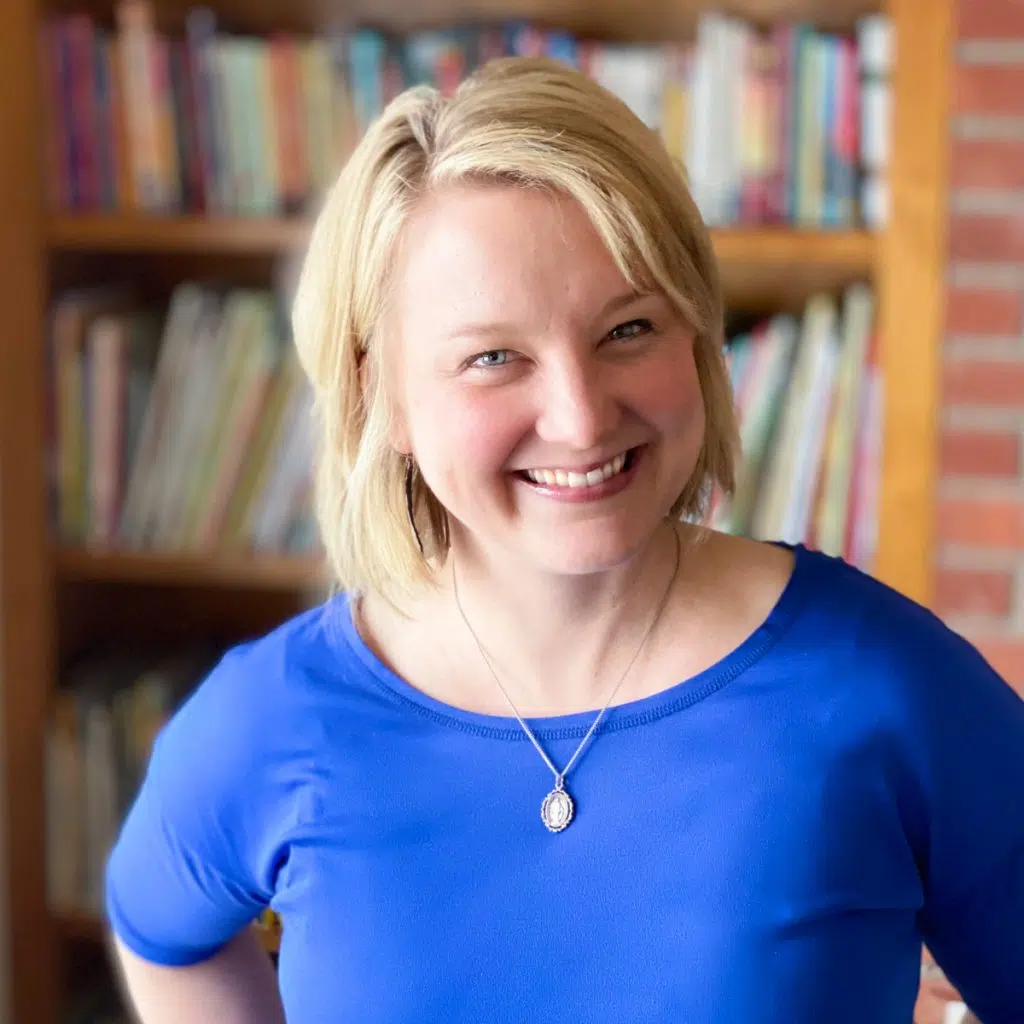
Watch my interview with Sarah Mackenzie
Prefer to listen to your content? Subscribe to Homeschool Conversations on Apple podcasts or wherever you get your podcasts so you don’t miss a single episode!
Amy: Hello friends. I am so delighted to be joined today by Sarah Mackenzie. Sarah’s best known as the author of Teaching from Rest: A Homeschooler’s Guide to Unshakable Peace and The Read-Aloud Family: Make Meaningful and Lasting Connections With Your Kids. She’s the host of the Read-Aloud Revival podcast (I know many of you already are listening to that one) and she’s also the publisher of a brand new boutique publishing house, Waxwing Books, and is the author of their first picture book, A Little More Beautiful: the Story of a Garden, which is illustrated by Breezy Brookshire.
I’m so glad that you’re here, Sarah. Could you start just by telling us a little bit about yourself and your family and how you guys got started on this homeschooling adventure?
Sarah Mackenzie: Yes, I’d love to. Thank you for having me, Amy. It’s just a complete delight to be here chatting with you. I love your chair. I don’t know how often you hear that.
Amy: Well, thank you.
Sarah: It’s a really fabulous chair.
Amy: Freecycle.
Starting Homeschool One Year at a Time
Sarah: Even better, even better. My husband, Andrew and I have been married for 21 years and we live in the Pacific Northwest. We have six kids. Our oldest is 20 years old. She just finished her sophomore year at university, and then we have another one we just graduated this year who’s heading off to her freshman year in college. We have a high schooler. We have a 10 year old, we have twins who are going to be nine very soon. A whole slew of children!
We have homeschooled all the way through, but if you had told my husband this back at the beginning, he would’ve said, “No, we are not.” When we first started homeschooling, our oldest was just a few years old and I had seen some old blog posts or forum chats. This was a long time ago. I’m trying to remember exactly the first hint I got at homeschooling, but it was something online. I started checking books out at the library and I loved this idea of home education.
Also, as she got older and became closer to kindergarten age, it was like, I don’t really want to send her away all day. She’s become really fun to be around. I love spending time with her.
I didn’t know anyone who homeschooled in my real actual life. My husband knew one homeschooling family growing up. They were super weird so he was like, “No, we are not homeschooling. That’s not going to be a thing.” We ended up actually arguing about it quite a bit.
Back then, let’s see, we had a five year old, a three-year-old, and a one-year-old at the time. Audrey– it’s time to send her to kindergarten. I realized there is no way God is calling us to two different ways. He’s not calling me to homeschool and my husband tо– I thought, we’ve got to stop arguing about this. I have to stop arguing about this. I’m just going to pray like crazy that God would lead my husband and I’ll just follow his lead here and we’ll just go.
We did, we researched all these local kindergartens because at the time we were living in a school district that was not great. You could actually pick any school you wanted your kids to go to in the whole district at the beginning of their kindergarten year. I visited several. I picked one. I cried quietly, was very good about keeping all this to myself at that point and not trying to start arguments.
Then my husband came home from work one day out of the blue. He does not remember now what was the thing that instigated this. He came home one day and said, “Okay, you can have one year.”
I thought I’ll take it. I’ll take one year. Then, about halfway through kindergarten, he said, “Okay, you can have a couple more. She seems to be doing great.” I think it’s one of those things where, when something is unfamiliar territory, we’re fearful, we’re not sure, we’re skeptical. As soon as we met other homeschooling families and we started, both of us really realizing the richness of a home education life, we didn’t want to give it up. You are a second generation homeschooler, right?

Amy: I am. Yes. I was homeschooled all the way through high school graduation and my husband was homeschooled through seventh grade. It’s really fun to be able to take the best things that we remember from our own home education and then put our own unique family spin on it. My oldest is now a rising senior, so I really enjoyed the recent episode you did with your daughter, that was really fun.
Sarah: Oh, it was really fun to hear her perspective. That’s something that I think I really craved early on, was the perspective of homeschooling moms who had finished or had gotten further than me and could look back and say, “Hey, focus on this and stop worrying so much about this other thing.” Hearing from my daughter, what helped her most her first couple of years in college, and what does she remember, what does she cherish most from those years was helpful. I’m not the interviewer, but I’m asking questions because I’m curious. Did you always know you would homeschool? Was that always something in your mind?
Amy: Yes. I had a really positive experience with homeschooling and felt like it provided a wonderful education experience. I loved the relationship I developed with my brother who was four years, but five grades, younger than I was. We were able to be really close growing up even through moves and things like that. I don’t think we would’ve had that same experience if we had been in a traditional school, so I had a great homeschool experience and my husband and I talked about it even before we were married. It was just a no brainer. It wasn’t a big decision for us. It was just what we decided to do.
Sarah: Yes. I love it.
Amy: I think that it’s really encouraging for people to hear your story because so many new homeschoolers are coming into this and they’re so scared because it seems overwhelming. Maybe even the preschool mom who’s like, “What about the high school transcript?” They already have globalized the worst-case scenario or what’s going to happen in 10 years. It can be a scary thing to step out in faith, especially if you don’t know anyone in your real life who’s doing this crazy thing or you haven’t seen the successful results of it in your real life.
I think it’s good to hear you started off not knowing a lot of people homeschooling, not having it all figured out. It was just this thing you were going to try for a year.
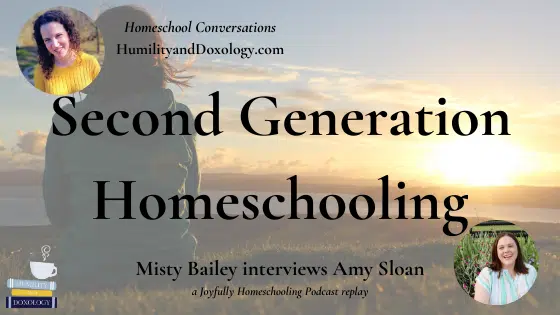
Growing in Homeschool Perspective Over the Decades
How has your approach to homeschooling, home education grown and changed over those ensuing years? However many, a couple decades now? No, less than two decades.
Sarah: A couple of things come to mind, first of all, that idea of what you just said about globalizing like, oh my gosh, you have a preschooler. We do tend to do this. I tend to do this at least, where I will be looking at my eight-year-old and realizing, I forgot to teach him how to tie his shoes. I’ve always got him velcro and oh my goodness, I’ve never taught him how to tie his shoes. Now I’m making it all about all the things that I have forgotten to teach him as if I’m launching him out into the world tomorrow, which is not what happens, we have all this time. But we do tend to do that.
I think one of the things that has shifted from my early days of homeschooling to now is having a little more perspective on what matters and what doesn’t, you know what I mean? Those moments where you realize you forgot to teach your kid how to tie their shoes or they say something about geography and you think, “Oh my goodness, you think France is one of the United States of America. I think we should probably fix this.”
You realize those gaps and things happen no matter where your kids are educated. We tend to wear that burden on our shoulders because we’re doing all the parenting and home educating so the pressure’s there.
I think also realizing that my oldest two who graduated, especially my oldest daughter since she’s 20 and we just had this conversation on the Read-Aloud Revival podcast about what was helpful to her, there are plenty of things I forgot, just downright either forgot or could not get to teaching her because we were so busy with our hands full babies, which we can talk about too that she just could fill in those gaps herself.
If they have the tools for learning and, like you’re talking about, you have these rich warm relationship or memories of your own homeschool, really warm, fond memories and sibling relationships with your brother. Those kinds of things carry our kids so much further. Listening to my oldest daughter talk about how the things that she really thinks she gained from homeschooling, so much of what she said was about relationships.
That really echoes what all these experienced homeschooling moms have been telling me for years, which is it’s all about relationships and you’re not going to wish you had spent more time doing math. You should do math, but no homeschooling mom is like, “I wish we had spent six more hours a week doing math.” They tend to remember relationships and say, “I wish I had enjoyed it more. I wish we had spent more time talking or reading together.” The warm relationship kind of things.
The other thing that comes to mind for me right away about how my homeschool has evolved, I guess over the years is that early on, I had a very deep longing to belong to a certain kind of homeschool group. I wanted to be either classical or Charlotte Mason or Unschooling or something. I wanted my people, I wanted to know who I was and where I fit in, which is very human that we all want to belong.
I think in an effort to learn all I could about those homeschooling philosophies and methods, I got wrapped up in this ideal version of what an ideal education could look like instead of looking at the children God gave me right in front of me, and being like, these are the children, these are the images of God that I am charged with bringing up, how can we do that? There’s great things in Classical and Charlotte Mason and Unschooling that can lend help there.
I got my eyes off the prize, instead of focusing on my kids I was idealizing. And we do this now, I think differently than we did 15 years ago, because now we do it by looking at Instagram or whatever, idealizing this perfect homeschool, where do I want my dream homeschool to be?
Really, your dream homeschool is right in front of you with the kids God gave you so that’s something that I feel like it’s grown me, just being more comfortable with being not really any particular homeschooler.
Pam Barnhill likes to say– she’s a homeschool mom of three, she’s got several podcasts. She likes to say that they’re Us-Schoolers instead of Unschoolers or Charlotte Mason, homeschoolers or something. I love that. I think that feels really accurate to me. We’re all just us-schoolers.
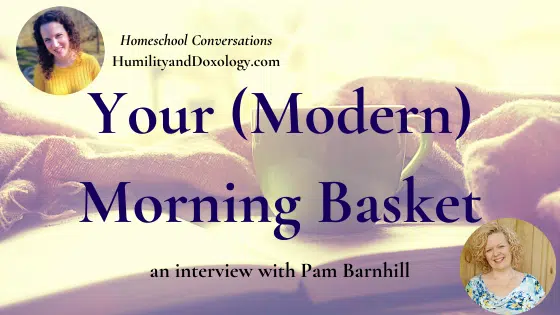
Amy: I think as a second-generational homeschooler, that is something that I really bring with me. My homeschool doesn’t look just the way my mom’s homeschool looked. It doesn’t look the way my mother-in-law’s homeschool looked, but what I’ve carried is I’ve never been inside the box. I’ve never been in the system, and so to be the rebel, unique, I’m just going to do what works best for my family comes very natural. That actually feels normal to me.
Being within the homeschool world now, which seems so different from when I was growing up where people have very strict labels and boxes, and if you do not fit their little labels and boxes, just quite right, you’re not in their group. That to me is like, I thought the whole point of homeschooling was figuring out what was going to work best for our unique families, taking the principles, the ideas, but then having the freedom to work those out in a unique, fun way that’s just for your family, right?
Sarah: Yes. Well, then one of the benefits, I guess, that we have in our generation now those of us who are homeschooling in the trenches now is we have all of these examples of homeschoolers who did homeschooling in a wide variety of ways and it worked on all accounts. It worked for families who were very classical and it worked for families who were unschooling and it worked for families who did all different kind used textbooks and then who didn’t use textbooks. The homeschooling works because of the relationships and because it’s based on love of between a parent and a child, which is the strongest human love that there is.
I just feel like we get that benefit now that your parents probably didn’t have. We’re the example that this works, they had to take it on faith going, like, “I really hope this works,” which we all feel a little bit, I will say. When I put together my oldest daughter’s transcripts and we sent them off to the university, she was applying to, I was like, “Oh, I really hope this works.” It does, it does.
Amy: It does. Even I’ve seen it work for myself but even now as my approaching that senior year with my son, I’m like, “I really hope this turns out okay.”
Sarah: I know. It’s so true.
Amy: Then I have to remind myself, this is not my identity. This is not where my hope lies, it’s outside of me.
Sarah: That’s right.
Amy: I’ll mention here, I’ll put this in the show notes, but I actually did a series on The Curriculum Choice website, a Homeschool Generations series, and I told my own story, but I also interviewed half a dozen first that first initial generation of homeschool mom. Then another part of it was I interviewed several other second-generation homeschool moms, more within my generation of having grown up and it was really interesting to see the perspectives from both sets of moms. I’ll put that link in the show.
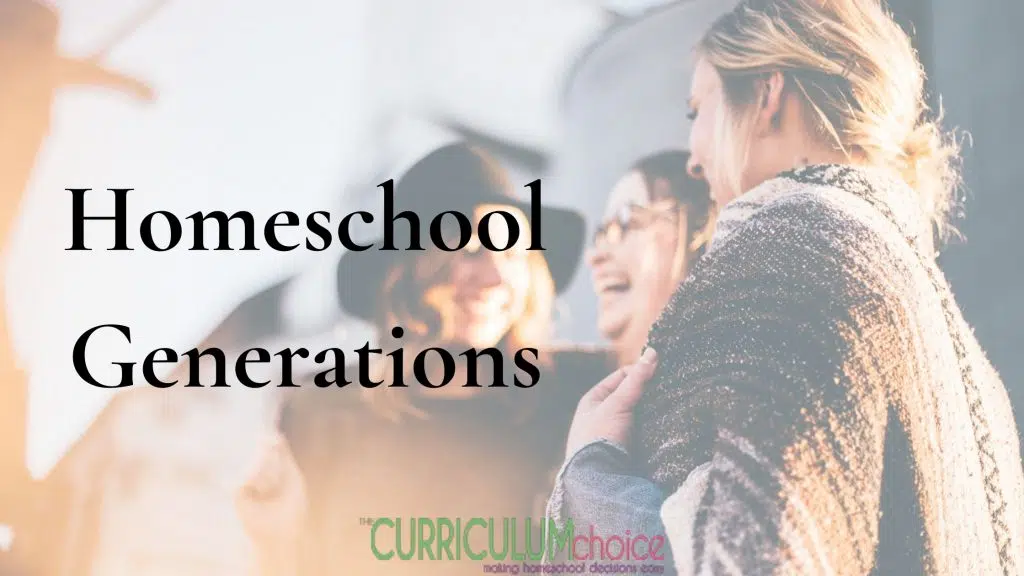
Sarah: That’s cool; I’ll check that out. That’s so interesting, and I think there’s so much that we can learn from those who’ve gone before and also, like you said, the homeschooling landscape looks very different now than it did 15 years ago. Again, when we’re thinking about– when I’m talking to Sally Clarkson or someone who homeschooled in a different climate really than we are, you can get so much wisdom and you can also go, okay, how does this apply to my own kids in my own and in our time and with the different social pressures that we have on us now, that maybe she didn’t. So it’s like that constant learning and growing.
Overcoming Challenges of Homeschooling
Amy: We’ve talked about some of these positive aspects of homeschooling, but it’s not all sunshine and roses, all shiny. Have there been any challenges that you have faced over the years homeschooling and how have you sought to overcome those challenges?
Sarah: Yes, which ones to pick that’s really, there’s like a litany of them. If we were all to ask ourselves, “What’s not working in your homeschool right now?” A lot of us could immediately think of five things. If we went, “What’s working really well?” Sometimes it takes us a minute. We’re like, just a second. I’m sure I can come up with something.
The biggest thing for me at the early days was pressure, social pressure from family and friends who also didn’t know any homeschoolers and thought we were for sure ruining our kids. And every homeschooler also has that little teeny worry, that is this really the best thing that we should be doing and am I actually rooting my children?
At one point in our homeschool, we had 12-year-old, 10-year-old, an 8-year-old, a 1-year-old, and twin newborns.
Amy: Nothing to do at all. It was real easy.
Sarah: Not at all, not at all. It was really challenging. I really worried that especially with the 12-year-old who’s about 6th grade-ish, those aren’t years that you just feel like you can just shrug school off for a while. Although we really didn’t do a whole lot because we couldn’t because I was drowning in babies. Those years were the pressure that I felt from outside to like put the kids in school, “You can’t possibly do this. You’re not superhuman. How are they going to learn CVC words, or basic math?”
Then also for myself about what I would be able to do and what I was expecting myself to do, that pressure, I think has been one of the biggest challenges and I really feel like as much pressure as some of us who have like unsupportive family members or whatever, still the pressure from inside’s harder, like the pressure we put on ourselves to get it right and tied to that, this idea of like a measuring stick.
I think for a lot of us, and I don’t know, Amy, you’ll have to tell me if this is true for you being homeschooled. I have this internal measuring stick that is based on my own education in the public school system that I pull out and I don’t even know I have it out. I’m measuring what my kids know and what they’re able to do based on what I knew and what I was able to do at different grades or ages or what the kids in my cul-de-sac who go to the local public school are able to do, I’m constantly using the wrong measuring stick.
I didn’t put them in school on purpose, and yet I continue to use the measuring stick that the public schools chose to measure their students. That has been a challenge. I think realizing that this way that a school measures success has zero bearing on the way that we can measure what we’re doing in our own homeschool. Is that something that you struggle with as well or is that different for you?
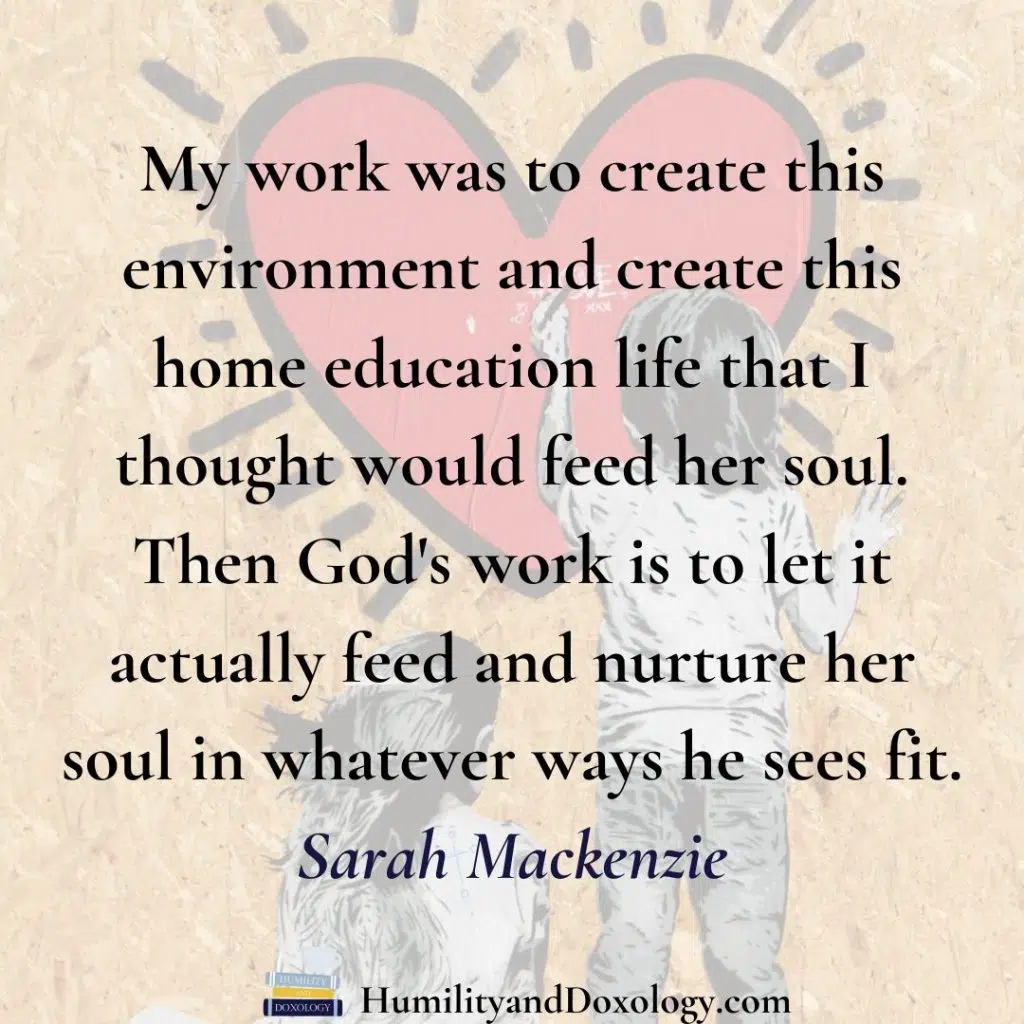
Amy: I think it’s a little different, but the same root fear, the same root anxiety, because I don’t even really know what a public school education would look like. I’m like, “Oh, I don’t care about that,” but when I see the other family that’s chosen to homeschool in a different way and, oh, I see the amazing things they’re doing with their kids I’m not doing with my kids, and I think to myself, but I’m doing it this way on purpose.
I chose this set of things and those are good things, but it’s always that comparison. Oh, but I’m not doing those things. Maybe if I only did those things, everything would go well and if I don’t do X, Y, Z, I’m ruining my children.
I think that comparison thing is always at the root of that fear as opposed to just having the blinders on, I’ve made this choice. That doesn’t mean we can’t learn and grow or make changes. We have to have that flexibility too, but that measuring stick thing that you pull out like, “Oh no,” I can really relate to that.
Sarah: Well, and actually, what you just said reminded me too, that idea of trade-offs, you have to put your blinders on, like I chose this. One of the things that I’ve struggled with, and I think we all do on some level and maybe some personalities struggle with it more than others, I don’t know, is that wanting to do more, wanting to do everything or getting bored easily. I have a tendency to get bored easily, want to start too many projects, and switch things all up.
I’ve had to create some guardrails for myself. One is that I don’t usually let myself switch curriculum in the middle of a six-week– I’ll give myself a six to eight-week term. For that amount of time, I have to stick with whatever I planned. Not like rigid, not as far as the schedule goes, but as in, I’m not allowed to on a Tuesday morning at 10 go online and order a whole new math curriculum because my math curriculum is not working. This is just know thyself.
This is just me knowing that that feels like a solution to me when it’s not a solution so it requires me to sit with the problem and go like, “Wait, maybe the solution is doing math at a different time of day or having–“
Amy: Or with chocolate.
Sarah: Exactly, exactly. [laughs]
Amy: Yes. I think knowing your own personality is really helpful. If you’re someone who thrives on change, but you know the best thing for your kid is to have that consistency, I like to find something that doesn’t matter to change and I know– For instance, in my family, it’s our memory work in Morning Time. I know every month the poems, the scripture passages, the hymn is all going to change so it’s just that month. That gives me something to look forward to.
I thrive on that novelty, but it’s not anything that’s going to throw off the whole school project for the year.
Sarah: That’s good, yes, it’s like a built-in novelty basically.
Amy: Yes.
Sarah: Well, the other piece there, I think too, is that so we all have to make trade-offs like we can’t do hands-on history and a whole bunch of science experiments and lots of field trips and a homestead and read aloud time and travel the world, we just can’t. We all have to pick what are your big things in your homeschool. I know for you memory work is a big piece of that. For me, one of the things I’ve realized is when I– because we all make these trade-offs.
I’ll go, okay, reading aloud is a huge piece for us in our homeschool. For years, I knew that I was making a trade-off. Yes, I’m going to choose reading aloud over other things because I know it’s better, but what I didn’t come to terms with is the fact that I was going to have to say no to other really good things, not just choosing read-aloud over everything that’s not good. I’m choosing it over a lot of other really good things too.
That I think maybe gets exacerbated by social media, because then we go on whatever social media choice that you use a whole bunch of homeschoolers who have made a different trade-offs and wonder if yours is the one that– We just have to because remind ourselves what you said earlier, we chose this on purpose. We did this on purpose.
Amy: I know that you know Dawn Garrett.
Sarah: Yes.
Amy: People are probably tired of me bringing this up but I love her post where she did that composite homeschool mom where she’s the little– it becomes a monstrous compilation of this person’s eye and this person’s nose, but somehow we have it in our head that we have to be the best parts of every homeschool mom instead of remembering we’re all doing some things and not doing others, that’s okay.
Sarah: Yes, absolutely, absolutely.
Amy: This idea about fineness and resting in that being okay with that, that not being a problem or something we have to change is a perfect segue to this next question, because I have been hearing actually from a lot of homeschool moms in totally different seasons, but they’re all saying about the same thing. They’re all worried that they’re not doing enough.
There are moms who have all of these little ones and they feel all they can get to is just keeping people in diapers. Maybe not even keeping the house clean, just literally keeping people fed and relatively nourished and loved is about all they can get to. They’re worried, “Am I failing my older kids?” We haven’t gotten to all the lessons or the read-aloud that I had planned.”
Or others are approaching high school and they’re thinking, “Oh my goodness. Now I have all this pressure of the high school years. What if I don’t do enough?”
I think that it can be easy to have these feelings of insufficiency, these doubts that we’re doing enough, that our homeschool is enough. It all comes down to there’s just one person. There’s just one us, there’s 24 hours. We can’t multiply that. How do we make the best choices? Like you were saying, there are so many good things.
We can’t even do all the good things. We’re not choosing between the good and the bad things. We’re choosing between multiple good things. How do we decide how to prioritize what’s best for our unique families and then how do we deal with those doubts when they creep up?
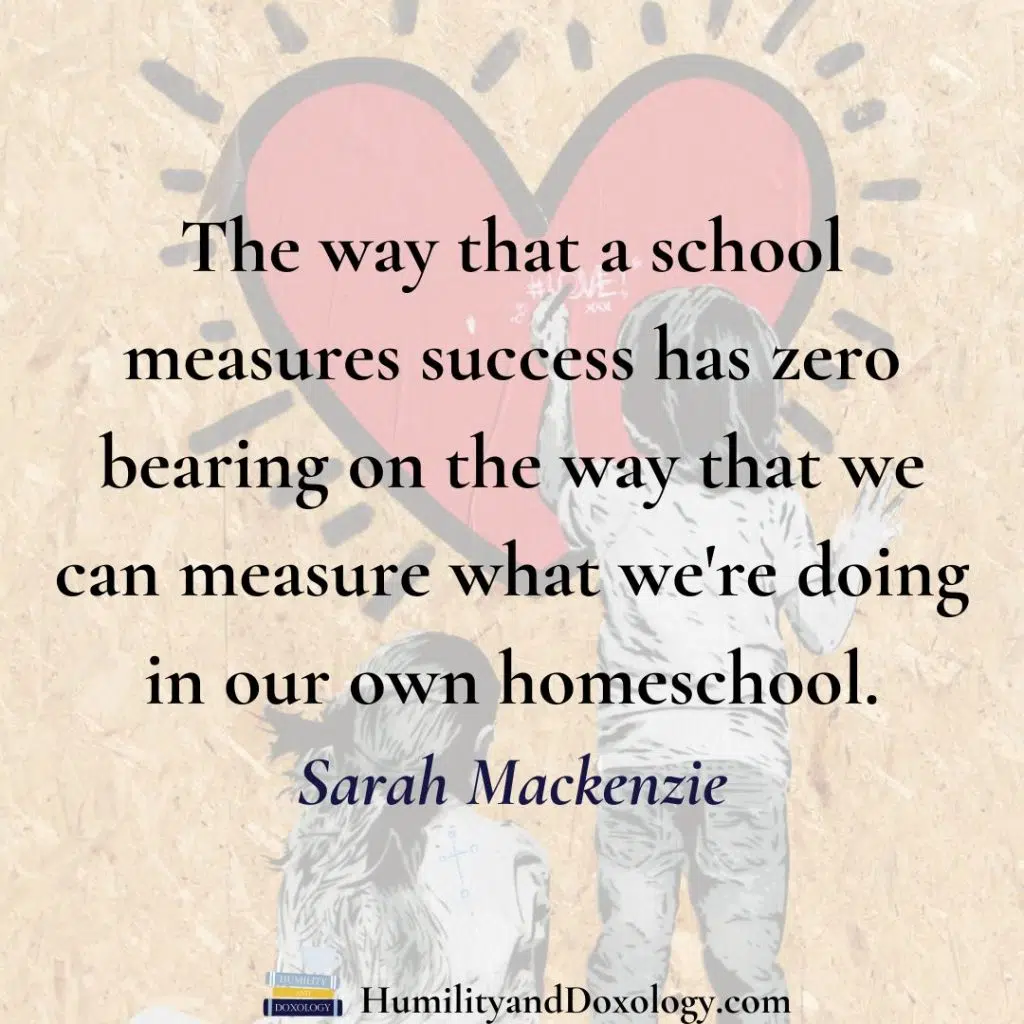
Sarah: I think there’s a couple things going on here. One is that– I don’t think we talk about this enough in the homeschooling world, but I think most homeschooling moms that I know tend to be, I’m here with them, I’m not pointing fingers. I’m here in it with them, tend to be a little on the “like to retain control” side of things.
That’s partly why we’re homeschooling, because we get to pick everything and be in charge. That can bleed over into this idea of deciding when we make a decision because we all have to make decisions about what gets priority in our school day, we’re also making a decision about what we want our kids to remember about their school experience.
When I was just talking to my daughter, my 20-year-old daughter about her memories of homeschooling, it just became very clear to me that regardless of doing things that I wanted her to remember, but whether or not she remembered those as the pivotal experiences was not up to me.
My work was to create this environment and create this home education life that I thought would feed her soul. Then God’s work is to let it actually feed and nurture her soul in whatever ways he sees fit.
One of the things that has been really helpful to me is that story in the Bible of Jesus feeding the 5,000 on the hillside. Imagining this huge crowd of 5,000 people and they’re all hungry, maybe the sun– it’s getting hot, and the disciples are looking around going all these people are going to need food and we have nothing to give them and send them away, which is how I feel every day when the school bus goes by my cul-de-sac, send them away. I don’t have enough for these children, especially in those days when I had three babies, and then the other kids, oh my goodness.
That was the perpetual state, it was not-enoughness, I don’t have enough for these kids, which is true because I didn’t and.
The good news though is that we weren’t really being asked to have enough. So if we were going to finish that sentence, “I’m afraid I’m not doing enough,” and we just finished it like “in math,” so that my kids will have all the math that they need to know. Or I’m not sure that I’m doing enough to nurture my kids’ faith so that they hold onto their faith when they’re older.
When we start drilling down, we might see the absurdity of the question or the idea of “being enough” anyway, because nobody can make sure that their kids hold on to their faith through their whole life. That’s not your job.
Amy: You’re not the Holy Spirit, right?
Sarah: Exactly. We take on the work of the Holy Spirit and wonder why we feel it’s an out-sized job. That is because you weren’t called to that. When we think back to that idea of feeding the 5,000, I always think it’s so interesting. Jesus could have instantly fed every single person on that hillside and in a blink of an eye, they could have all had a huge feast in front of them. Maybe that would’ve been more impressive than what he did was said, Well, bring me what you have. He looks at his disciples.
They said, “We don’t have anything. We don’t have enough, send them away.” Jesus says, “Bring me what you have.” They have this little basket from a little boy of a couple loaves of bread and some fish and he makes it enough.
That reminds us that’s what we’re being called to do. Our job is not actually to feed the 5,000 or to make sure our kids have everything they possibly need and get a certain result or outcome.
Our job is to bring our basket, is to give them what we have, which every day is never going to feel enough. Because it’s helpful for us then to remember that we’re not actually being called to get a certain result or to be “successful” in the eyes of the world or even in the eyes of the greater homeschool community. We are being called to be faithful every day. When we remember that, then we can go, “Okay, I’m not actually supposed to be enough.” This feeling of not-enoughness is normal and it’s good because it makes me rely on the Holy Spirit.
Amy: I think that’s so important because if we can actually, instead of thinking, well, I just, okay, I ought to do more, do more, be better. Instead, if we can say, “Yes, I’m a creature. I’m not the Creator. This is who I am.” Turning us to Christ and the work he’s already done, if we can rest in that hope, then it takes away so much of the fear, worry, and anxiety of this got to do more, got to be a better homeschool mom, can’t let anybody down… because that is a burden we are not designed to handle.
Sarah: No, it will. I think burnout is really common in homeschooling and it has this cyclical nature in the life of a homeschooling parent, I think over the course of like a year of school year. That’s why we all want to quit in October and in February. Also over the long term, I remember when my oldest daughter went off to college, it was the first time I really realized I’m got to be in my home school longer than anyone else because I’ve been homeschooler since the beginning and she’s moved on and I’m still here very much in it. I don’t remember where I was going with that exactly.
Just this idea of what are we actually called to do, and then realizing that you said, we’re finite creatures, we have limitations and that’s not a downside. That’s not a limitation actually. The fact that we have limitations is exactly how we were designed. That’s exactly the best way for us to home educate our kids and to raise them, and to help them grow in their faith and grow in their academic skills and life skills. That’s exactly how it’s meant to work. We tend to think of it as a limitation, but that’s because we’re letting the world whisper in our ear.
Amy: God is faithful to sustain the children in ways that we can’t even. I think about my own memories and don’t really remember a specific math worksheet I did in the seventh grade or something that. I remember the time my mom beat on the museum door after it had just closed and she was, “We’re from out of town. Can’t you let us in,” and we got a personal tour.
Sarah: Did you really?
Amy: Yes.
Sarah: Amazing.
Amy: She was, “Well, if you don’t ask, the answers already no.”
Sarah: That’s right.
Amy: Those are the things that I remember that gave me a joy and a love for learning. Sometimes I’ll be like, “Kids, don’t you remember this amazing thing I did with you?” They’ll be like, “No, I have absolutely no memory of that.” I’m thinking to myself, hours and time and energy and money I put into this and you don’t remember it at all, but then they’ll bring up some random thing, I’ll be like, “I don’t even remember that,” but that’s what Lord has used to stick in their heart and their mind.
Sarah: That’s so good.

Experiencing Homeschool with a 2nd Set of Kids
Amy: As you think about you get to do this homeschool thing again with a second set of kids, I was curious if there are any books in particular or poems, things that you were so excited to get to experience again with your younger children.
Sarah: It’s really fun actually to have another batch of children because I can go, “Oh yes, this really was exciting.” One of the things I love to do is revisit Shakespeare. We just do all usually read a Shakespeare play a year, so I’m not doing a whole bunch of them, just maybe one a year. A lot of times we’ll start by just reading adaptations of it, picture book versions or whatever of the play.
Then we might listen to the real Shakespeare. We might just listen to snippets of it, might memorize some passages from it. That is always fun. I will say this year we did a Midsummer Night’s Dream. I was doing it with my twin 8s and my 10 and my 16-year-old son happened to be in the kitchen making himself lunch and wanders into the room and starts reciting with us. The look on his face, he didn’t realize he had remembered it either, that when he was like, “Oh, I still have that,” was really fun and rich, so that’s really fun.
I love also when I’m reading to my younger kids. Whether it’s a novel or a picture book, and I won’t even realize until I look up that the older kids have come in. [chuckles] They’re looking over my shoulder at the pictures because they remember it, so that was fun.
The books that I’m most excited to revisit are some of my favorite classics like, Heidi and The Secret Garden, The Trumpet of the Swan by E. B. White. I’m going to do that one this next year with the kids. I cannot wait. I love that book so much.
Then there’s been some fun new experiences. I never read Tolkien with my older kids. I just never did. The younger kids and I read-aloud The Hobbit twice this last year. Actually, we listened to it on audio. It was so fun that I almost was like, “Oh man, I really missed out on this with the older kids,” which is another funny thing that happens when you’re– [chuckles] Yes, those are things that come to mind first for me.
Amy: It’s not just sometimes with my younger ones. I think, “Oh, man, all the things that I’m not doing with you that I did with the older kids.”
Sarah: Oh, true. Yes.
Amy: Then I have to remind myself, “I’m doing stuff with them. I didn’t do it with the older ones. It’s just different. It’s not better or worse. It’s just different.” [chuckles]
Sarah: That’s right. That’s right.
Waxwing Books
Amy: In the introduction, I mentioned the new publishing house that you guys are starting. I’m so excited about this. I would love it if you could tell us a little bit about Waxwing Books.
Sarah: Yes, I would love to. I’m very excited. We’ve been working on this for a long time, but now we are finally ready to launch the baby into the world. I’m very excited.
The publishing house, it’s basically a new independent imprint, a boutique imprint. We’re really focusing on making books that kids will love to read but parents will also love to read-aloud, because we all know that when we’re reading aloud with our kids, they often want the same book over and over and over again.
Those books that we read again and again and again. They can have a really high literary quality, and a really high artistic value to make them enjoyable for the parents, and also just really rich.
We can all probably think of a picture book we really enjoy reading with our kids. Then also another one that makes us feel like we’re going to poke out our eyeballs. How do we make more like this the first and less like the later.
At Read-Aloud Revival, that’s what we’re doing. That’s why we’re starting Waxwing Books.
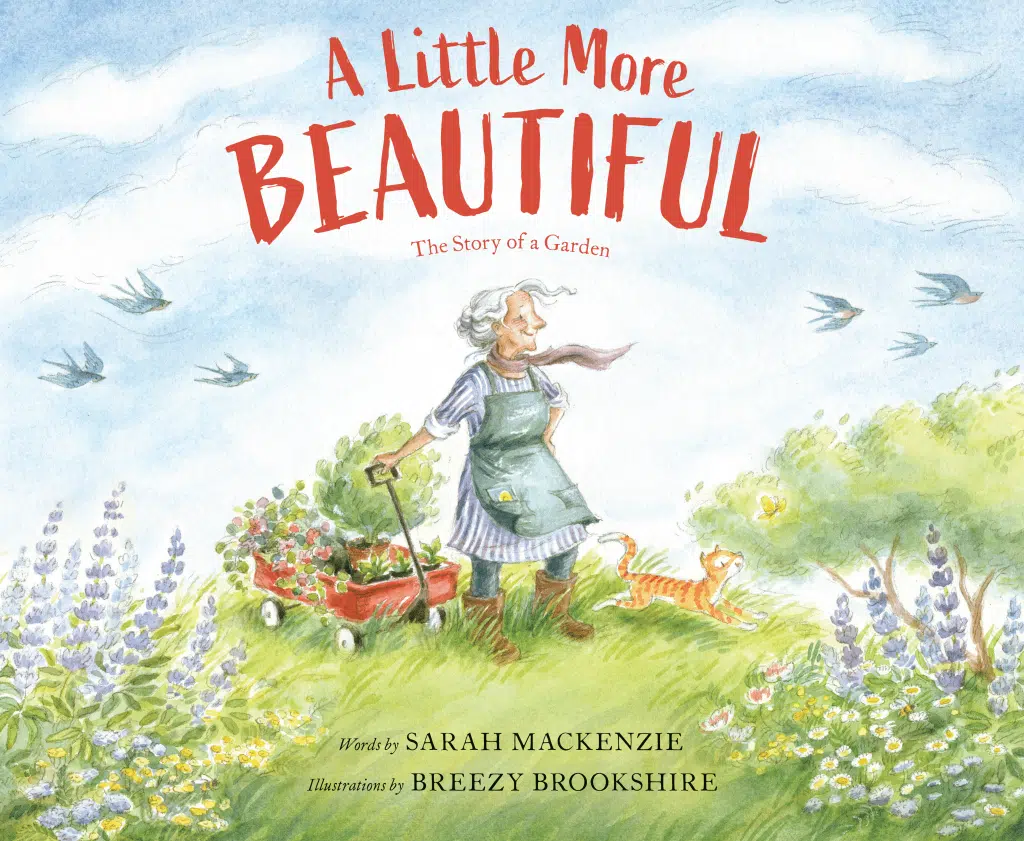
We are releasing our first picture book. We’re opening it up to pre-orders this summer, August 10th. We’re actually going to release it on Kickstarter for pre-orders, because it’s brand new for us, and we have no idea how many books to print. We have been working on– It’s been very exciting. We’ve hired pros from the New York publishing industry to help us with art direction, and book design, and editing, and copy editing. It’s been such a huge learning curve for me.
Every time I turn around, I’m like, “Here’s another thing, I have no idea what to do, but we’re going to figure it out.” We’ve made this really gorgeous book, but we just have no idea how many to print. This is a completely new territory, so we decided to launch it on Kickstarter, which actually is really fun, because if you’ve ever backed a project on Kickstarter, you’ll know that the way Kickstarter works is you get to pre-order the book, and then you get to pick some fun rewards.
We’ve made custom seed packets that have art from the book illustrated by Breezy Brookshire. She was homeschooled, so that’s fun. Yes. Her illustrations are just stunning. We have seed packets with those. We have a book bag. We’re only releasing with the Kickstarter and prints, and postcards, and really fun things. That’s fun because we’ve got to make a lot of extra pretty things. It’s really fun to make extra pretty things when you have Breezy’s art to play with.
Amy: Yes, the little preview sneak peeks I’ve seen of her art, absolutely gorgeous, really beautiful. I’m definitely going to have the link to the Kickstarter, and more information about Waxwing Books in the show notes. Wherever you’re listening or if you’re watching, be sure to click through and get your own special seed packets, and book bags, and fun pre-order stuff.
Sarah: Yes, thank you.
What Sarah Mackenzie is reading lately
Amy: Sarah, here at the end. I’m going to ask you the questions I love to ask all my guests. The first one is just what are you personally reading lately?
Sarah: Oh, fun. I love this question. I am rereading one of my new favorite historical fiction novels called The Last Bookshop in London. Have you read this, Amy?
Amy: I have not, but Heather Tully, a previous guest ,recommended it to me. I got it from the library, but then I didn’t get to it. Then the library sent me nasty emails telling me I needed to return it.
Sarah: Speaking of that, funnily enough, I just last night had a dream that I owed $100 in library fines from The Last Bookshop in London. I was standing there looking at the library like, “How can I possibly owe $100 for a $15 book? I don’t understand how this works?” I had this whole argument with the librarian in my dream.
Amy: Such a homeschool mom nightmare.
Sarah: Yes, you wake up panting, sweating. “The library fines!!” That’s really funny.
It’s a historical fiction novel. It’s an adult novel, but teens could enjoy it. There’s nothing inappropriate in it. My teen– let’s see. No, my second daughter hasn’t read it yet. It’s on her list. It’s spectacular. It’s got all the World War II things you expect in a World War II novel. Like the London Blitz, and they use words like, “Ducky” and stuff to speak to each other. There’s reading aloud that happens in the bomb shelters. It’s just amazing.
When I was reading it, I was like, “How can this book be real? How can this exist in the world? It was made for me.” I’m rereading that one. We’re reading it for our fan– We always do a Mama Book Club at Read-Aloud Revival Premium for our moms. We always read a book together each season. That’s what we’re reading this summer, and then we get to interview the author, Madeline Martin. That’s why I’m reading it.
Then the kids and I are finishing up a book that we started in the spring. That’s taking us a million years to read-aloud, which is Johnny Tremain. It’s very good. It’s just taking us a million years. Also, it’s summer, and our normal read-aloud rhythms go cattywampus in the summer. We don’t get to it as regularly. It’s just, I like things to move along at a clip, then I’m feeling like, “Oh, this book’s really starting to drag, we’ve got to finish this thing.” [chuckles]
Amy: Yes, and that one, in particular, I feel like is a denser book to read-aloud. I’ve actually just given that one to audiobook. I’m like, “We’ll listen to that as an audiobook, or you can read it on your own.”
Carry on Mr. Bowditch is the best read aloud because every chapter is short. A little bit past the Revolutionary War time period, but every chapter is short, and it’s great for reading aloud. I’m like, “This is what every read-aloud book should have.”
Sarah: I don’t think I’ve ever read Carry on Mr. Bowditch.
Amy: Oh. You have so much to look forward to. It’s historical fiction based on a true story of Nathaniel Bowditch. He was an American navigator. Oh, you have to read it. You will love it.
Sarah: Okay, I cannot wait. Okay. We’re moving forward. We’re reading through historical fiction, chronologically through American history.
Amy: This is your next title. This is your next title.
Sarah: Yes. Awesome. Okay, I cannot wait.
Sarah’s Best Tips for Helping the Homeschool Day Run Smoothly
Amy: The final question I have for you would be, what is your best tip for helping the homeschool day run smoothly?
Sarah: Oh, can I give two answers? Two tips? [chuckles]
Amy: Of course.
Sarah: Okay, one is, if you have any humans in your house four and under, plan to do less. There is much rich learning and loving, and relationship building, and life skills happening when there are toddlers and preschoolers under foot. Your kids are learning how to lay their lives down for each other. They’re learning things you can’t quantify, and you won’t even know for 10, 15 years. I know it feels like when you have a bunch of preschoolers and toddlers, that you’re not getting to anything meaningful, but you just can’t see it because you’re in it, and I couldn’t either.
Plan to do less and let God do more, because he will. The relationship stuff that’s happening. That you can’t put on a transcript or put on a lesson plan sheet to check off at the end of the day are really rich. That’s the stuff that really matters.
Then the other thing I would say, that’s super practical, that I do every time I look at a new homeschool plan, or we’re going to start a new school year. I’m like, “Okay, what does our school day is going to look like?” I start by plugging in my read-aloud, when am I going to read-aloud, and when are my kids going to have time to read alone.
We do a quiet reading time. My pre-readers, well, I don’t have any pre-readers anymore, but when I had pre-readers, they would listen to audiobooks during this time. It’s like either half an hour to an hour, depending on their age, of time when the only thing they can do is read in their rooms on their beds. They can read whatever they want from our collection, but they have to read. That’s the only thing, well, they can sleep, but no kid wants to sleep anyway, in the middle of the day. Alas.
At a time, at the beginning, when I started doing quiet reading hours. We’ve got quiet reading hour, even if it’s not an hour. They resisted a little bit, now it’s their favorite time of day, because they know it’s the time they can read whatever it is that they want to. Not just school books, they could if they wanted, but again, they get to choose.
I plug those two things in first because I know that a lot of days go off the rails, and if I know that they’ve had time to read, and I’ve read-aloud with them, throw in some math there, and I can be like, “That was a win even if we got to nothing else.”
Amy: Oh, that is a really great tip. I like that because I think sometimes we forget to plan for that reading aloud or the reading alone time. If you don’t plan for it, it’s just too easy for it to get forgotten or neglected.
Sarah: True, yes.
Find Sarah Mackenzie and Waxwing Books Online
Amy: Sarah, where can people find you and Waxwing Books all around the internet?
Sarah: Okay, the best place to find me is Read-Aloud Revival, that’s at readaloudrevival.com. You’ll find everything there. We have awesome book lists based on different months of the year, holidays, we have picture book biographies, suggestions for different time periods. All kinds of really good book lists there at readaloudrevival.com. That’s also where you can find our podcast and all of our free resources. Then the Waxwing Books, our first book. Pre-orders will open August 10th, 2022.
The best place to find out more about that is at either waxwingbooks.com, or you can go find out about the book directly by going to alittlemorebeautiful.com.
Amy: Okay. Great. We will have links to all those things in the show notes for this episode over at www.humilityanddoxology.com. Thank you so much, Sarah. This has been an absolute treat to get to chat with you.
Sarah: I have just loved chatting with you. Thank you so much, Amy.
Check out all the other interviews in my Homeschool Conversations series!
